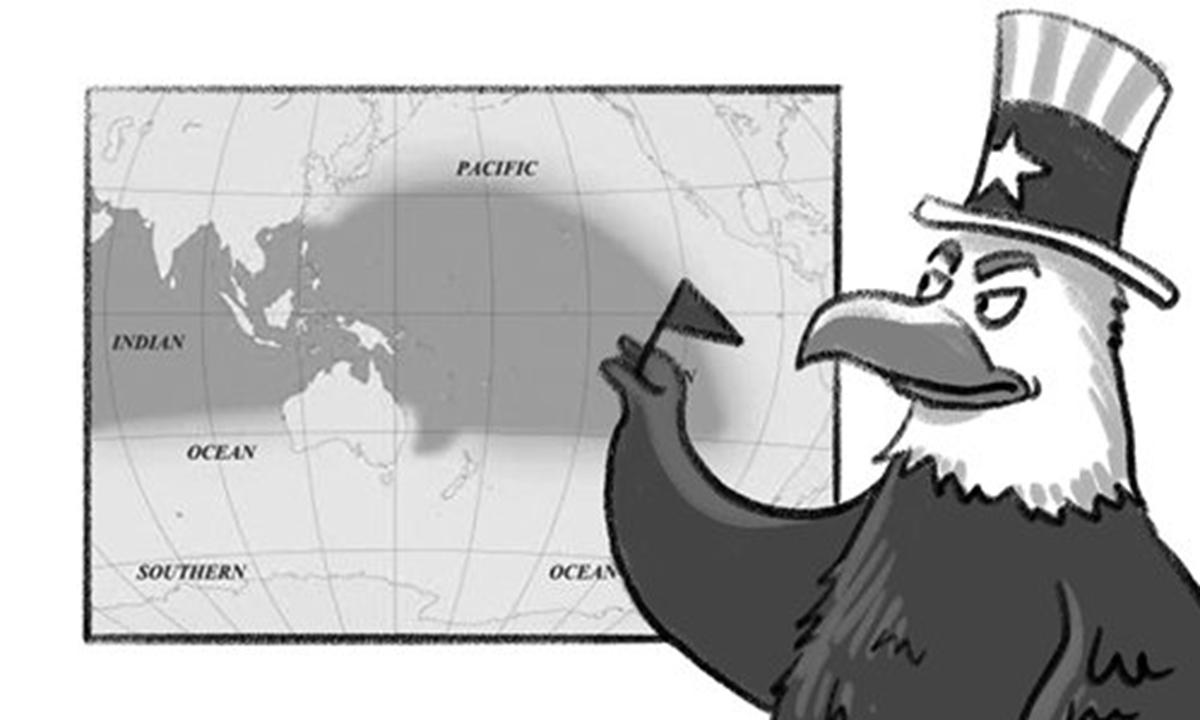Hard for US Indo-Pacific strategy to succeed
By Sun Chenghao Source: Global Times Published: 2020/9/2 23:23:40

Illustration: Liu Rui/GT
The US has been promoting military development in the Asia-Pacific region for years. This entails allying with Japan, India and Australia to treat China as an imaginary enemy. The Trump administration has transformed Obama's Asia-Pacific rebalancing strategy into the current Indo-Pacific Strategy. However, the strategy proposed by US President Donald Trump has only achieved a little military success.
In the economic and diplomatic fields, the Indo-Pacific Strategy still has flaws that may lead to its collapse. In 2018, US Secretary of State Mike Pompeo announced a $113 million investment plan for the region as a gift to win confidence back from Asia. However, countries in the region generally believe that the investment amount is far from enough. It is impossible to compete with China's investment level in terms of both scale and scope. That's a cold hard fact.
Second, the corresponding policy promised by the US, Japan and Australia to counter the China-proposed Belt and Road Initiative has not yet been implemented. In addition, the US has not attached great importance to economic cooperation with Southeast Asian countries. Combined with the impact of the COVID-19 pandemic on local economies, the Indo-Pacific Strategy has contributed little to the economical growth of the so-called Indo-Pacific region.
In terms of diplomacy, Trump is not a fan of multilateralism. We can see from his attitude toward the ASEAN Summit that he has no interest in maintaining multilateral relations with India-Pacific countries. What's more, Japan, Australia and India have their own diplomatic considerations. They do not want to completely stand on the frontline of the Indo-Pacific Strategy.
There are inherent contradictions in this strategy. The US has the "America First" policy. India has its "Neighborhood First" policy. Moreover, it is unrealistic for the US to tie Japan, Australia and India to its own warship. Washington openly admits that Tokyo and Canberra are security allies in the Asia-Pacific region and that they have been cooperating with each other in military fields for a long time.
And tensions between China and India seem to have added fuel to the promotion of the Indo-Pacific Strategy. However, India, as a special link in this emerging alliance, is more interested to synergize its "Eastward Action" policy and does not want to lose its autonomy. In this regard, New Delhi will not be the faithful companion for Washington.
It is clear that there will be more military cooperation and exercises in the Indo-Pacific region hosted by the US, which will also target China as a challenger in a more focused manner. But these four countries are far from forming an Indo-Pacific version of a "little NATO" given its progress and effectiveness.
In fact, the Indo-Pacific Strategy is a very empty one. Apart from the slogan of "openness and freedom," there is no substantial quantitative goal that can be achieved or measured. If its strategic goal is to merely forge a closer alliance between the US and regional countries, it may have some outcomes. However, it is obvious that US investment - especially that amid the pandemic - in the region cannot satisfy regional countries. With so little input, the US can hardly realize its wishful Indo-Pacific Strategy smoothly.
Regardless of the result of the November election, US leaders are well aware that the future of the 21st century lies in the Asia-Pacific region. Thus, the fundamental direction of US diplomatic policies toward the region will remain unchanged. While the US is putting fewer diplomatic resources in the Middle East and Europe, US leaders will devote more energy to the Indo-Pacific region. China, seen by the US as its top challenger, will be attached more attention to by Washington.
Such being the case, on the one hand, China needs to emphasize and insist on regional peace and stability in diplomatic policies. On the other hand, it should keep boosting bilateral cooperation with the so-called US allies.
Though Japan, India and Australia depend heavily on the US for security affairs, they have closer economic ties with China. In particular, China and Japan are close neighbors separated by only a narrow strip of water - the two countries have been maintaining relatively stable cultural and people-to-people exchanges. To stabilize bilateral relations with these countries can be China's main policy in response to the challenges posed by the US.
The author is a research fellow with the Institute of America Studies, China Institutes of Contemporary International Relations. opinion@globaltimes.com.cn
RELATED ARTICLES:
Posted in: VIEWPOINT